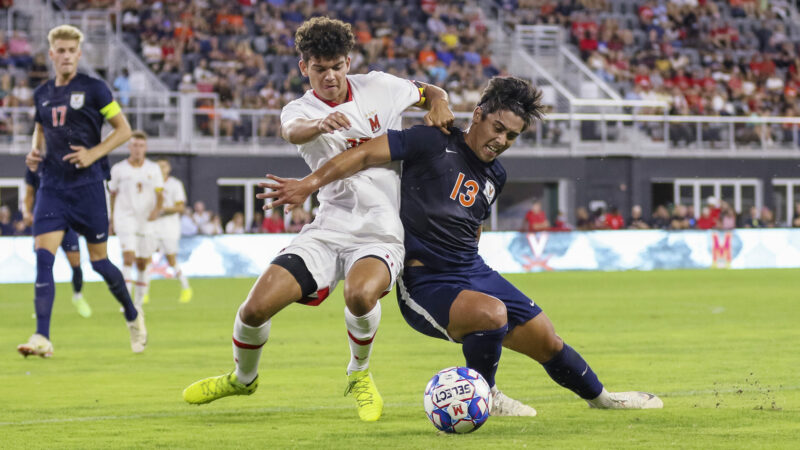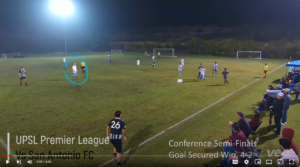
Getting recruited for college soccer can be a challenging process and is often full of highs and lows. Whether you’re a talented high school player dreaming of playing at the collegiate level or a parent navigating the complexities of recruitment, this guide is tailored to help you navigate the recruitment journey successfully.
Understanding the College Recruitment Process: Before diving into the specifics of how to get recruited for college soccer, it’s crucial to understand the recruitment process itself and to also know it can look very different for different players. College soccer recruitment typically involves a series of steps, including scouting, communication with coaches, campus visits, and official offers. Familiarizing yourself with these steps will provide a solid foundation as you embark on your recruitment journey. Although these are the normal steps most athletes will need to go through, I also know players who performed well at the right time and the right place and and ended up being recruited without any of the steps. This is by far less typical so being consistent and diligent is your best chance to get recruited for college soccer!
Table of Contents
Starting Early
The key to get recruited for college soccer is to start early. Join a competitive club team as early as possible and work on improving your level of play to get to the clubs’ most competitive team you can. Pick a club that is invested in developing their players and not just winning. Begin showcasing your skills and talents on the field as soon as possible, ideally during your freshman or sophomore year of high school. Contact the coaches at the colleges you are interested in. Let them know who you are and that you are interested in their school. Send them a highlight video if you have one and let them know what showcases if any you will be playing in. This allows college coaches to get to know you, track your progress over time, and gauge your potential as a player.
The Importance of Club Soccer vs. High School Teams
Participating in Club soccer provides a higher level of competition compared to high school teams. Club teams often compete in elite leagues, tournaments, and showcases where they face off against top-tier opponents from across the region or even nationally. This exposure to high-level competition allows players to continuously challenge themselves and develop their skills in a more competitive environment.
Additionally, club teams often participate in recruiting showcases and tournaments specifically designed to attract college coaches’ attention. These events provide invaluable opportunities for players to showcase their talents directly to college recruiters, increasing their visibility and chances of being recruited by all levels of programs from D1 to NAIA.
Build a Strong Athletic Profile
When coaches are assessing players for the college level, they look at many different aspects of a player’s game such as touch, vision, ball handling, speed, agility, strength and conditioning. Consider working with a personal trainer or coach to improve your athleticism, enhance your performance on the field and improve on your weaknesses. Practice your skills on your own outside of practice. Make sure you know what specific skills coaches are looking at for your position on the pitch so you can continue to improve on those. Soccer can be very taxing on your body so It’s important to take care of it! Eat food that is good fuel, do your stretches (possibly yoga), strengthen your core and get plenty of rest. I’ve seen too many kids who miss playing in important games, showcases, or tournaments where they can be seen in front of college coaches because they are injured.
Create a Compelling Highlight Reel

One of the most effective tools for catching the attention of college coaches is a highlight reel showcasing your best plays and moments on the field. Invest time in creating a high-quality highlight reel that accurately represents your skills and abilities as a soccer player. Be sure to include a variety of clips demonstrating different aspects of your game, such as scoring goals, making assists, movement off the ball and defensive plays. Don’t just show your best moves or goals against weaker opponents. Coaches want to see how you play against strong teams. Make sure to include highlights from these games and include the name of the team you are playing. This will give the coach much more context to evaluate you for their level and style of play.
Research Potential Schools
Take the time to research and identify colleges and universities with strong soccer programs that align with your academic and athletic goals. Consider factors such as team reputation, coaching staff, academic offerings, and campus culture. Create a list of target schools and prioritize them based on your preferences and aspirations. Be honest with yourself about your level of play. Are you truly a D1 player? There are many D2 and D3 schools that have incredible soccer programs. Unless your goal is just to play soccer, remember that your education is the most important reason to attend a college. Focus on the schools that are well suited to you and the major you want to pursue.
Reach Out to College Coaches
Once you’ve identified your target schools, initiate contact with college coaches to express your interest in their soccer program. Send personalized emails introducing yourself, highlighting your accomplishments, and expressing your desire to play for their team. You must be proactive in following up with coaches and maintaining regular communication throughout the recruitment process. They are busy and are receiving many highlights and emails from other hopeful recruits around the country so don’t give up.
Follow up with every coach who contacts you even if you think you aren’t interested in their program – don’t burn any bridges! Coaches talk and that could lead to other opportunities. A player from my son’s team was contacted and recruited by a D1 school that he had not sent any emails to or been in contact with. This came about because a coach from another college he was in contact with told the D1 coach they should take a look at him.
Attend College ID Camps and Showcases


College ID camps and showcases provide valuable opportunities to showcase your skills directly to college coaches in a competitive setting. Attend as many showcases and high quality ID camps as you can, and come prepared to perform at your best. Use these events as a platform to make a lasting impression on coaches and increase your visibility as a recruit.
Prepare for Campus Visits
As interest from college coaches grows, you may receive invitations for campus visits and official recruiting trips. Take advantage of these opportunities to experience campus life firsthand, meet with coaches and players, and gain insight into the soccer program’s culture and expectations. Prepare thoughtful questions to ask during your visits to demonstrate your genuine interest and enthusiasm.
Stay Persistent and Patient
The college soccer recruitment process can be lengthy and competitive, requiring patience and perseverance. Stay focused on your goals, continue honing your skills, and remain open to opportunities that may arise throughout the process. Remember that success often comes to those who are willing to put in the time and effort to make their dreams a reality.
Conclusion: Getting recruited for college soccer is a multifaceted journey that requires dedication, preparation, and strategic planning. By following the tips outlined in this guide and staying proactive in your approach, you can maximize your chances of catching the attention of college coaches and securing a spot on a collegiate soccer team. Keep pushing yourself, stay resilient in the face of challenges, and never lose sight of your passion for the game. With determination and hard work, your dream of playing college soccer can become a reality.


